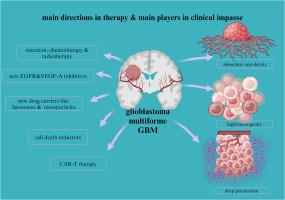开发治疗多形性胶质母细胞瘤新靶向疗法的起点。
IF 5
2区 医学
Q2 Medicine
引用次数: 0
摘要
多形性胶质母细胞瘤(GBM)是侵袭性和致死性最强的脑肿瘤之一,其特点是生长迅速、侵袭性强,并对手术、化疗和放疗等标准疗法具有抗药性。尽管在治疗方面取得了进展,但由于其复杂的分子机制,包括血管生成、侵袭、免疫调节和脂质代谢失调,GBM 仍具有很强的抗药性。本综述探讨了靶向疗法的最新突破,重点关注纳米粒子和脂质体等创新药物载体及其克服 GBM 化疗和放疗耐药表型的潜力。我们还讨论了参与 GBM 进展的分子途径和最新的治疗策略,包括有望改善临床疗效的免疫疗法和精准医疗方法。综述强调了了解 GBM 遗传和分子异质性的重要性,以便制定更有效的个性化治疗方案,提高 GBM 患者的生存率和生活质量。本文章由计算机程序翻译,如有差异,请以英文原文为准。

Starting points for the development of new targeted therapies for glioblastoma multiforme
Glioblastoma multiforme (GBM) is one of the most aggressive and lethal brain tumors, characterized by rapid growth, invasiveness, and resistance to standard therapies, including surgery, chemotherapy, and radiotherapy. Despite advances in treatment, GBM remains highly resistant due to its complex molecular mechanisms, including angiogenesis, invasion, immune modulation, and lipid metabolism dysregulation. This review explores recent breakthroughs in targeted therapies, focusing on innovative drug carriers such as nanoparticles and liposomes, and their potential to overcome GBM's chemo- and radioresistant phenotypes. We also discuss the molecular pathways involved in GBM progression and the latest therapeutic strategies, including immunotherapy and precision medicine approaches, which hold promise for improving clinical outcomes. The review highlights the importance of understanding GBM's genetic and molecular heterogeneity to develop more effective, personalized treatment protocols aimed at increasing survival rates and enhancing the quality of life for GBM patients.
求助全文
通过发布文献求助,成功后即可免费获取论文全文。
去求助
来源期刊

Translational Oncology
ONCOLOGY-
CiteScore
8.40
自引率
2.00%
发文量
314
审稿时长
54 days
期刊介绍:
Translational Oncology publishes the results of novel research investigations which bridge the laboratory and clinical settings including risk assessment, cellular and molecular characterization, prevention, detection, diagnosis and treatment of human cancers with the overall goal of improving the clinical care of oncology patients. Translational Oncology will publish laboratory studies of novel therapeutic interventions as well as clinical trials which evaluate new treatment paradigms for cancer. Peer reviewed manuscript types include Original Reports, Reviews and Editorials.
 求助内容:
求助内容: 应助结果提醒方式:
应助结果提醒方式:


